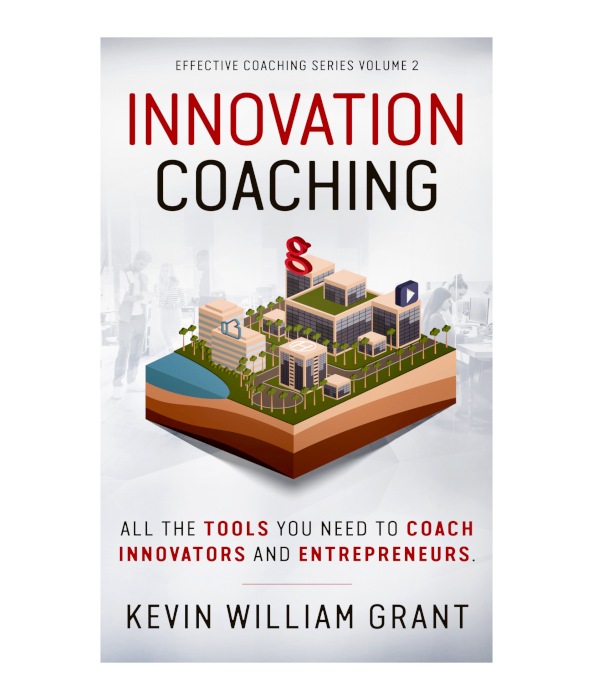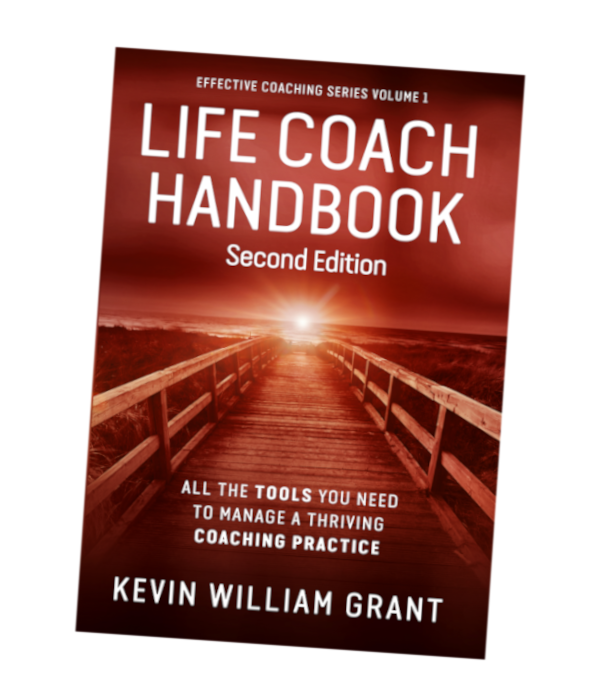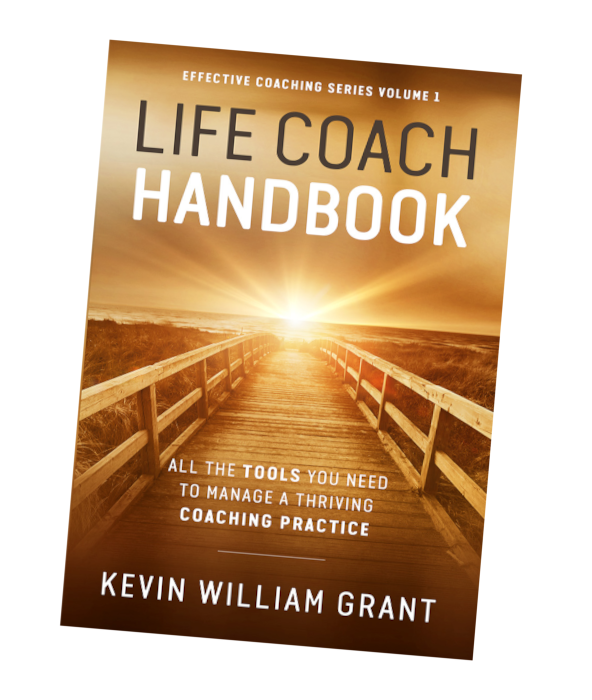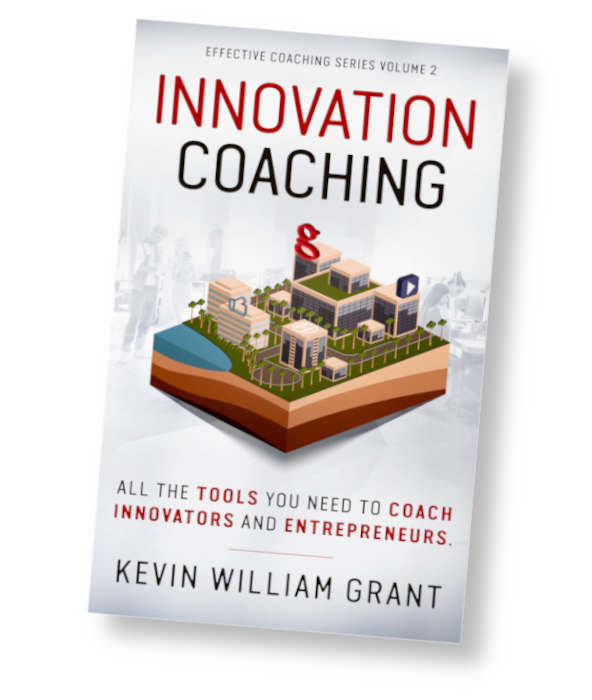Book Overview
All the Tools You Need to Manage a Thriving Coaching Practice
Kevin William Grant
Within this volume will cover the fundamentals of setting up a coaching business and share tools and techniques that will help you launch and run a thriving coaching business.
Coaching conversations leave clients invigorated, inspired, and ready for action. Life coaching inspires clients to live the life they want and live through the parts they don’t. Coaches draw upon the lessons the client has already learned and their strengths to achieve positive and lasting change. Coaching conversations help clients identify how to live their very best life, the one that taps into their full potential, strengths, and gifts.
Life coaching is a process of developing the questions that lead to the answers that are right for you. Fundamentally coaching does not assume the answers aren’t out there for you; you already have all of your answers. The coach facilitates the exploration of how and where to find them.
Coaching encourages deep reflection about yourself and your life to increase personal insight and awareness. Apply this new understanding to make clear, informed, and fresh choices.
Finally, coaching is about committing to actions that will create real, lasting change and move you towards a more meaningful, happy, and fulfilling life.
The coaching alliance is truly designed as a partnership in the service of a particular client's goals and desires—these are co-created with the client and coach.
This textbook covers the fundamentals of setting up a coaching business. I share tools and techniques that will assist you in launching and running your thriving coaching business. I approach this topic from coaching, psychology, counseling, marketing, and corporate management perspectives. The following foundational coaching resources are covered in this handbook:
- Context— Background information, research findings, theory, and contextual material that will give you the background you need.
- Guidelines— Best practices that will streamline your coaching processes and guarantee you deliver high-quality coaching services to your clients.
- Planning— Critical planning and decision-making techniques to rapidly optimize your coaching business.
- Records— Best practices for professionally documenting coaching information such as notes, records, intake, agreements, questionnaires, and feedback.
- Skills— Core coaching skills, techniques, and tips so you can get certified, launch your coaching business, and start immediately.
- Mental Health— Insights, context, and tools that will ensure you take into account, manage, and appropriately refer clients with mental health issues.
- Business— Foundational knowledge needed to run your business, manage financials, market your services effectively, create your brand, and build your Internet presence.
- Exercises— Proven techniques that will generate immediate success by jumpstarting the coaching process with your clients.
- Forms— Sample forms and business documents you can adapt and tune to your specific coaching practice.
- Tools— Smart tools that will help pinpoint particular client issues so you can make informed, empathetic, and professional coaching decisions.
Life Coach Handbook
Table of Contents
- Introduction
- Comparing Coaching to Related Professions
- The Origin of Modern Coaching
- What Makes a Competent Coach?
- Coaches Remove Obstacles
- Synopsis
- Introduction
- Vision, Mission, Values, and Ethics
- Identify Your Niche
- Set Your Pricing
- Develop Your Marketing Plan
- Create Your Tag Line
- Develop an Authentic Introduction
- Market Features and Benefits
- Create Your Internet Presence
- Managing your Internet Identity And Persona
- Setup Professional Communication
- Create Your Marketing Tools
- Marketing Your Business
- Implement Customer Relationship Management
- Form Strategic Alliances
- Synopsis
- Introduction
- Sample Welcome Letter
- Sample Coaching Agreemen
- Sample Client Consent and Agreement
- Client Informationtake Questionnaire
- Policies and Procedures
- Synopsis
- Introduction
- Listening
- The Structure of a Coaching Session
- Powerful Questions
- Communication Styles
- Core Values Exploration
- Vision Exploration
- Goal Exploration
- Assess Work-Life Balance
- Giving and Receiving Feedback
- Synopsis
- Introduction
- SOAP Notetaking
- Initial Client Inquiry Notes
- First Session Notes
- Ongoing Session Notes
- Coach Self Evaluation and Reflection
- Upcoming Coaching Session Planning
- Quality of Service Survey
- Privacy
- Synopsis
- Introduction
- Core Elements of Mindfulness
- The Benefits of Mindfulness
- Mindfulness Techniques
- Gestalt Coaching
- De-Cluttering
- Journaling Form
- Important Questions to Ask Yourself
- Synopsis
- Introduction
- Emotions and Feelings
- Empathy Not Sympathy
- Core Emotions
- Identifying and Releasing Feelings
- Identifying Emotions
- Synopsis
- Introduction
- The Impacts of COVID-19 on the Brain
- Chronic Pandemic Stress
- The Mass Trauma of the COVID-19 Pandemic
- Treating Pandemic Trauma
- Stigma and Prejudice
- Quarantines and Isolation
- Pandemics Force New Ways to Resolve Conflict
- Synopsis
- Introduction
- Optimism
- Transtheoretical Model of Behavior Change
- Action Requests
- The Problem-Solving Process
- Synopsis
- Introduction
- Supporting Clients Through Life Transitions
- Emotional Exhaustion, Burnout, and Life Transitions
- Working with Grieving Clients
- Mourning
- Letting Go and Moving Forward
- Life Transition Coaching
- Career Transition Coaching
- Managing Employment Transitions
- Taking Inventory of Transferrable Skills
- Dating and Anxiety
- Synopsis
- Introduction
- What is Psychotherapy?
- The Mental Health Impacts of Stress
- Trauma
- Panic Attacks
- Stress and Burnout
- Stress, Anxiety, and the Benefits of Cognitive Behavioural Therapy
- Mental Health Assessment
- Finding Professional Support
- Mental Health Recovery from the Client’s Perspective
- Referring Clients With Mental Health Issues
- Building A Wellness Recovery Action Plan
- How the Client Wants Support Delivered
- Researching Preferred Recovery Resources
- SelectIng Local Professional Resources
- Schedule A Professional Consultation
- Synopsis
- Introduction
- Organizations that Inhibit Innovation
- Workplace Power Dynamics
- Emotional Numbing
- Managing Conflict
- Abusive Workplaces
- Toxic Workplacess
- Factors That Create a Toxic Culture
- Health and Mental Health Impacts of Toxic Workplaces
- Workplace Trauma Denial
- Workplace Bullying
- Toxic Behavior
- Chronic Stress and Work-Life Balance
- Management Revenge and Being Set-up-to-Fail
- Synopsis
- Introduction
- Building and Maintaining Your Network
- Healthy Coping
- Monitoring for Signs of Potential Relapse
- Coping with Trauma Triggers
- Coping with Suicidal Thoughts and Behaviors
- Managing Setbacks with Compassion
- Synopsis
- Introduction
- Defining Innovation
- Experimentation
- The Innovation S-Curve
- Sustaining Versus Disruptive Innovation
- Incremental Versus Disruptive Innovation
- Innovation Horizons
- Innovation Process
- The Iterative Spiral Approach
- Innovation Ambition
- Fail Fast, Fail Often, Fail Cheaply
- When To Copy and Improve Rather Than Innovate
- Training Innovation May Not Be Possible
- How Innovation Succeeds
- Personality and Innovation
- Synopsis
- Introduction
- AI Trends
- AI Transforming Organizations
- AI Transforming Management
- AI Will Eliminate Middle Management
- AI Transforming Banking
- AI Transforming Cybersecurity
- Societal Implications of AI
- The Coming Singularity
- Synopsis
- Introduction
- Coaching Trends
- Continuing Your Learning
- Core Competencies Overview
- Core Competencies in Detail
- Introduction
- Key Definitions
- ICF Core Values and Ethical Principles
- Section I - Responsibility to Clients
- Section II - Responsibility to Practice and Performance
- Section III – Responsibility to Professionalism
- Section IV - Responsibility to Society
- The Pledge of Ethics of the ICF
- Overview
- Establishing and maintaining a relationship of trust
- Perceiving, affirming and expanding the client’s potential
- Engaged listening
- Processing in the present
- Expressing
- Clarifying
- Helping the client set and keep clear intentions
- Inviting possibility
- Helping the client create and use supportive systems and structures
- Ethical Principles
- Code of Ethics
- General Standards
- Advertising/Public Statements
- Coaching Relationship
- Privacy and Confidentiality
- Coaching Training
- Coaching Research and Publishing
Life Coach Handbook
Table of Contents
- Introduction
- Comparing Coaching to Related Professions
- The Origin of Modern Coaching
- What Makes a Competent Coach?
- Coaches Remove Obstacles
- Synopsis
- Introduction
- Vision, Mission, Values, and Ethics
- Identify Your Niche
- Set Your Pricing
- Develop Your Marketing Plan
- Create Your Tag Line
- Develop an Authentic Introduction
- Market Features and Benefits
- Create Your Internet Presence
- Managing your Internet Identity And Persona
- Setup Professional Communication
- Create Your Marketing Tools
- Marketing Your Business
- Implement Customer Relationship Management
- Form Strategic Alliances
- Synopsis
- Introduction
- Sample Welcome Letter
- Sample Coaching Agreemen
- Sample Client Consent and Agreement
- Client Informationtake Questionnaire
- Policies and Procedures
- Synopsis
- Introduction
- Listening
- The Structure of a Coaching Session
- Powerful Questions
- Communication Styles
- Core Values Exploration
- Vision Exploration
- Goal Exploration
- Assess Work-Life Balance
- Giving and Receiving Feedback
- Synopsis
- Introduction
- Core Elements of Mindfulness
- The Benefits of Mindfulness
- Mindfulness Techniques
- Gestalt Coaching
- De-Cluttering
- Journaling Form
- Important Questions to Ask Yourself
- Synopsis
- Introduction
- Emotions and Feelings
- Empathy Not Sympathy
- Core Emotions
- Identifying and Releasing Feelings
- Identifying Emotions
- Synopsis
- Introduction
- The Impacts of COVID-19 on the Brain
- Chronic Pandemic Stress
- The Mass Trauma of the COVID-19 Pandemic
- Treating Pandemic Trauma
- Stigma and Prejudice
- Quarantines and Isolation
- Pandemics Force New Ways to Resolve Conflict
- Synopsis
- Introduction
- What is Psychotherapy?
- The Mental Health Impacts of Stress
- Trauma
- Panic Attacks
- Stress and Burnout
- Stress, Anxiety, and the Benefits of Cognitive Behavioural Therapy
- Mental Health Assessment
- Finding Professional Support
- Mental Health Recovery from the Client’s Perspective
- Referring Clients With Mental Health Issues
- Building A Wellness Recovery Action Plan
- How the Client Wants Support Delivered
- Researching Preferred Recovery Resources
- SelectIng Local Professional Resources
- Schedule A Professional Consultation
- Synopsis
- Introduction
- Optimism
- Transtheoretical Model of Behavior Change
- Action Requests
- The Problem-Solving Process
- Synopsis
- Introduction
- Supporting Clients Through Life Transitions
- Emotional Exhaustion, Burnout, and Life Transitions
- Working with Grieving Clients
- Mourning
- Letting Go and Moving Forward
- Life Transition Coaching
- Career Transition Coaching
- Managing Employment Transitions
- Taking Inventory of Transferrable Skills
- Dating and Anxiety
- Synopsis
- Introduction
- SOAP Notetaking
- Initial Client Inquiry Notes
- First Session Notes
- Ongoing Session Notes
- Coach Self Evaluation and Reflection
- Upcoming Coaching Session Planning
- Quality of Service Survey
- Privacy
- Synopsis
- Introduction
- Coaching Trends
- Continuing Your Learning
- Core Competencies Overview
- Core Competencies in Detail
- Introduction
- Key Definitions
- ICF Core Values and Ethical Principles
- Section I - Responsibility to Clients
- Section II - Responsibility to Practice and Performance
- Section III – Responsibility to Professionalism
- Section IV - Responsibility to Society
- The Pledge of Ethics of the ICF
- Overview
- Establishing and maintaining a relationship of trust
- Perceiving, affirming and expanding the client’s potential
- Engaged listening
- Processing in the present
- Expressing
- Clarifying
- Helping the client set and keep clear intentions
- Inviting possibility
- Helping the client create and use supportive systems and structures
- Ethical Principles
- Code of Ethics
- General Standards
- Advertising/Public Statements
- Coaching Relationship
- Privacy and Confidentiality
- Coaching Training
- Coaching Research and Publishing

Synopsis
Discover the ultimate guide to thriving in the fast-paced world of innovation and entrepreneurship. "Innovation Coaching" is an indispensable resource designed for life coaches, educators, therapists, mental health professionals, innovators, and entrepreneurs. This comprehensive guide delivers pragmatic advice to empower you, protect your mental well-being, and navigate the complexities of innovation.
Uncover the Power of Innovation
Innovation is more than just a buzzword; it's a journey filled with challenges and triumphs. This book delves into the heart of what it means to innovate, offering insights from clinical psychology, life coaching, and corporate management. Learn how to embrace failure, manage stress, and cultivate a resilient mindset to turn your innovative ideas into reality.
Mental Health Meets Innovation
The unique blend of mental health awareness and innovation coaching sets this book apart. Understand how certain personality traits and workplace environments can impact mental health positively or negatively. Gain strategies to maintain mental health, recognize toxic work environments, and foster a supportive culture for innovation and entrepreneurship.
Practical Tools and Techniques
From persuasion and self-confidence to effective feedback and conflict management, "Innovation Coaching" equips you with the tools needed to lead and inspire. Explore the essentials of building an innovation lab, facilitating continuous innovation, and overcoming organizational barriers. Each chapter is packed with practical techniques to enhance your innovation skills and lead your team to success.
Why You Need This Book
- Empower Yourself: Learn to safeguard your mental well-being while navigating the innovative landscape.
- Inspire Others: Cultivate a positive and creative environment that fosters collaboration and growth.
- Real-World Applications: Apply theoretical insights directly to your professional and personal contexts.
- Comprehensive Guide: Covering everything from the fundamentals of innovation to the nuances of mental health in the workplace.
Take the Next Step in Your Innovation Journey
"Innovation Coaching" is not just about surviving the innovation process; it's about thriving. Whether you're an experienced entrepreneur or just starting, this book provides the essential guidance and inspiration needed to succeed. Dive into the world of innovation with confidence and clarity, and unlock your full potential.
Start your journey towards becoming a master of innovation and mental resilience.
About the Author: Kevin William Grant is a seasoned professional with extensive experience in corporate innovation management, clinical psychology, psychotherapy, and life coaching. His diverse background includes roles at Microsoft, TD Bank, Mozilla, The Globe and Mail, and Bell Canada, bringing a wealth of knowledge and practical insights to the table.
Innovation Coaching
Effective Coaching Series Volume 2
Table of Contents
- The Power of Failure
- Business Failure
- Mental Health in the Workplace
- Support for Innovation and Entrepreneurship
- Importance of a Supportive Investment Culture
- Summary
- Synopsis
- Introduction
- Defining Innovation
- Experimentation
- The Innovation S-Curve
- Sustaining Versus Disruptive Innovation
- Incremental Versus Disruptive Innovation
- Innovation Horizons
- Innovation Process
- The Iterative Spiral Approach
- Innovation Ambition
- Fail Fast, Fail Often, Fail Cheaply
- When To Copy and Improve Rather Than Innovate
- Training Innovation May Not Be Possible
- How Innovation Succeeds
- Personality and Innovation
- Synopsis
- Persuasion
- Self-Esteem
- Confidence
- Effective Feedback
- Conflict
- Summary
- Synopsis
- Introduction
- Characteristics of Innovation Facilitating Workplaces
- Employee-Led Innovation Culture
- Common Elements of Innovation Teams
- The Innovation Lab
- Summary
- Synopsis
- Introduction
- Why Innovation is So Challenging Within an Organization
- Characteristics of Innovation Inhibiting Workplaces
- Innovation Barriers
- Workplace Power Dynamics
- Abusive Workplace Culture
- Toxic Workplaces
- Toxic Behavior
- Bullying
- Chronic Stress and Work-Life Balance
- Innovation Stress and Trauma
- Management Revenge and Being Set-up-to-Fail
- Barriers to Innovation in Banking: A Case Study
- Summary
- Synopsis
- Introduction
- Structural Factors
- Management Factors
- Innovation Theater
- Innovation Theater in Action
- Summary
- Synopsis
- Introduction
- Emotions and Innovation
- Feelings Guide Us
- Manipulation
- Guilt
- Anger and Injustice
- Managing Toxic Positivity
- Emotional Numbing
- Empathy
- Summary
- Synopsis
- Introduction
- Personality Traits that Enhance Innovation
- The Mental Health Benefits of Creativity
- Conflict
- Fear and Rejection
- Social Isolation
- The Mental Health Impacts of Innovation Stressors
- Panic Attacks
- Trauma and Post-Traumatic Stress Disorder
- Depression
- Anxiety
- Obsessive-Compulsive Disorder (OCD)
- Burnout and Stress
- The Relationship Between Mental Health and Innovation
- Summary
- Synopsis
- Introduction
- Mindfulness
- Wellness
- Trauma Recovery
- Coping with Suicidal Thoughts and Behaviors
- Building and Maintaining Your Network
- Support
- Professional Assistance
- Summary
- Synopsis
- Introduction
- Be Your Self-Advocate
- Recovery Professionals
- Finding Professional Support
- Researching Preferred Recovery Resources
- Selecting Local Professional Resources
- Schedule A Professional Consultation
- How to Get the Most out of Psychotherapy
- Summary
- Synopsis
- Comparing Coaching to Related Professions
- The Origin of Modern Coaching
- What Makes a Competent Coach?
- How Coaches Remove Obstacles
- Summary
- Synopsis
- Introduction
- Listening
- The Structure of a Coaching Session
- Powerful Questions
- Communication Styles
- Core Values Exploration
- Vision Exploration
- Goal Exploration
- Assess Work-Life Balance
- Giving and Receiving Feedback
- Coaching Trends
- Learning More About Coaching
- Summary
- Synopsis
- Introduction
- Vision, Mission, Values, and Ethics
- Identify Your Niche
- Set Your Pricing
- Develop Your Marketing Plan
- Create Your TagLine
- Develop an Authentic Introduction
- Market Features and Benefits
- Create Your Internet Presence
- Manage your Internet Identity And Persona
- Set Up Professional Communication
- Create Your Marketing Tools
- Market Your Business
- Implement Customer Relationship Management
- Strategic Alliances
- Record-Keeping, Notes, and Privacy
- When Coaching is Not Appropriate
- Summary
- Synopsis
- Introduction
- Optimism
- Life Transitions
- Working Through Loss and Grief
- The Transtheoretical Model of Behavior Change
- Life Coaching
- Navigating Employment Transitions
- Summary
- Synopsis
- The COVID-19 Pandemic
- Artificial Intelligence and Transformation
- Summary
- Synopsis
- Introduction
- Grief Coaching
- Life Transition Coaching
- Career Transition Coaching
- Managing Employment Transitions
- Finding a Healthy Workplace
- Summary
- Synopsis
- My Innovation Journey
- Closing Thoughts
- Core Competencies Overview
- Core Competencies in Detail
- Introduction
- Key Definitions
- ICF Core Values and Ethical Principles
- Section I - Responsibility to Clients
- Section II - Responsibility to Practice and Performance
- Section III – Responsibility to Professionalism
- Section IV - Responsibility to Society
- The Pledge of Ethics of the ICF
- Overview
- Establishing and maintaining a relationship of trust
- Perceiving, affirming and expanding the client’s potential
- Engaged listening
- Processing in the present
- Expressing
- Clarifying
- Helping the client set and keep clear intentions
- Inviting possibility
- Helping the client create and use supportive systems and structures
- Ethical Principles
- Code of Ethics
- General Standards
- Advertising/Public Statements
- Coaching Relationship
- Privacy and Confidentiality
- Coaching Training
- Coaching Research and Publishing





